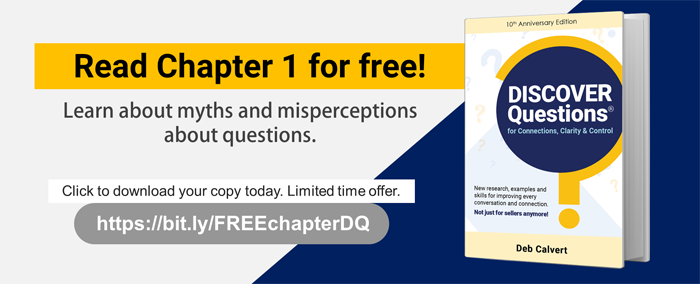Avoid Being Misunderstood and Causing Defensiveness
To avoid being misunderstood, the best defense is a good offense. Instead of avoiding conversations or allowing them to get off track, offer clear statements of intent when opening conversations or posing questions.
Many of the misperceptions about questions stem from skipping the important first step of framing your intent. Especially when you’re broaching a sensitive topic, take time to explain your intentions.
Let’s revisit one of the most frequent fears related to asking questions. You may shy away from questions that could cause a defensive response. You may avoid asking any questions of people you perceive to be highly sensitive or prone to defensive responses.
We can divide defensive responses into two categories: the ones you can’t control and the ones you can.
In a study of defensive responses, researchers determined that “Defensiveness is reduced when people feel secure in their group identity, respected and valued.”
Certainly, you can make efforts to help others feel secure, respected, and valued. You cannot, however, anticipate and prevent defensive responses related to:
-
mistaken perceptions that the situation is threatening.
-
unwillingness to accept responsibility and inappropriate deflection of blame.
-
extreme anxiety or emotional states driven by unrelated factors.
-
attempts to avoid being seen as vulnerable.
-
misrepresenting what occurred or denying involvement.
There will be situations like these where you still need answers to your questions. You can’t duck, dodge, or deny the need to proceed. The techniques described here will help in some cases. But, in others, you’ll encounter impenetrable defensiveness. Try your best to break through the walls of defensiveness and know that you won’t be successful when the other party is unwilling to be helped by your attempts.
Incidentally, try to avoid positioning yourself this way, as it will raise doubts about you. As Thomas Paine wrote, “It is error only, and not truth, that shrinks from inquiry.”
Now let’s take a closer look at what you are able to control. You can often avert negative reactions simply by making your intentions clear.
Researchers from Facebook and Cornell collaborated to better understand what caused breakdowns in 7,129 social media conversations. “Discourse involves two perspectives: a person’s intention in making an utterance and others’ perception of that utterance. The misalignment between these perspectives can lead to undesirable outcomes, such as misunderstandings, low productivity and even overt strife…subsequent conversation is more likely to derail into uncivil behavior.”
State Your Intentions to Avoid Being Misunderstood
This social media research reveals that the biggest risk factor in conversations is when the intentions of the initial speaker are misperceived. The same is true in face-to-face dialogue. Researchers at The Institute for Logic, Language and Computation (ILLC) describe dialogue as a joint activity that depends greatly on intention recognition and mutual understanding of intention. Their analysis highlights the importance of speakers grounding their intentions.
Grounding, as a concept for communication, refers to the constellation of mutual knowledge, mutual beliefs, and mutual assumptions that result in clear, complete, and common understanding between two people. Successful grounding, the ILLC researchers concluded, requires both recognition and adoption of intention.
To reduce the risk of misunderstandings, defensiveness, strife, and negative interactions, it’s critically important to convey your intentions.
This is a snippet from the new book, DISCOVER Questions® for Connections, Clarity & Control, available on Amazon.

